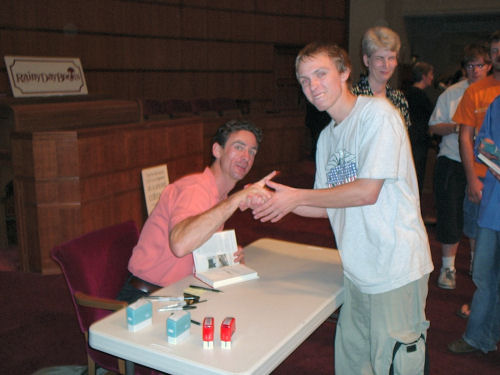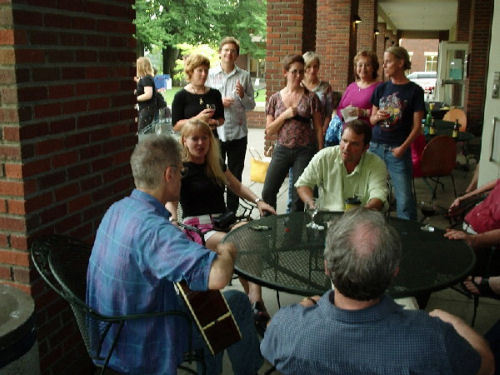Jonathan Franzen: “The whole culture of selling has become personalized”

Mr. Gordon Highland and I took in a Jonathan Franzen reading this evening at the Kansas City Unity Temple (presented by Rainy Day Books). Franzen read from the same stage on which I met (re: awkwardly shook hands with) Chuck Palahniuk a few years ago. I bring these two authors together here not just because of their temporal-turned-spacial bond, but because the association allowed me to ponder their very different approaches to the live author reading.
Via a video posted on August 14th, Franzen noted his “profound discomfort” in having to make promotional author videos, basically, to me, implying that any promotional discussion taken place off the page stands in contrast to the intimate nature of a novel…
I get that. In fact, I may even sometimes agree with that. So I was glad when one of the audience members during the night’s reading asked a question that allowed Franzen to tangentially elaborate on his remarks (I post the abbreviated question below to show that Franzen wasn’t specifically addressing the above video, but instead a matter that relates to the video’s message):
Q: When the writer reaches a certain level of prominence, does the focus on the author’s personality threaten to overshadow the work or become an irrelevant distraction?
“The weird thing is, the way people think they know who you are is based on very little information…Obviously the point of that entire episode (referencing the infamous 2001 book club situation between himself and Oprah Winfrey), was not to teach one person, me, not to trust media representations of the actual personalities of people, but that is the lesson I took from it.”
“It’s not bad in the same way that it was bad when Hemingway and Faulkner became public figures because I think the culture wasn’t so distracted back then…The whole culture of selling has become personalized. I don’t think it’s all bad. The kind of frenzy and the kind of gotcha culture….and the opinions based fourth- or fifth-hand on something, that’s an artifact of our electronic culture, and probably bad. That’s what good books are supposed to be helping to resist.”
So on to Palahniuk, who seems to embrace the idea of a novelist performer. His events are the anti-reading, full of fainting fans, inflatable sex dolls, and morally questionable book inscriptions, on top of the reading itself. The performance has become the reading for Palahniuk fans.
What is the author’s role in performance-based book promotion? Should authors resist performance, forcing the reader (and the reader’s forum discussion, online book reviews, and, ahem, blog posts) to testify for a book? Or, should authors embrace the possibilities of our changing culture? Perhaps in the world of Kindles and Nooks, the author video will become to the new book cover, the new visual representation of a book.
 |
| Awkward Palahniuk handshake |
 |
| And for no real reason, here’s a photo I took of Denis Johnson singing Bob Dylan songs at the 2004 Tin House Writers Workshop |



I also posed a similar question to Stephen Graham Jones in this interview (first question).
http://craigwallwork.blogspot.com/2009/12/interview-with-stephen-graham-jones.html
Great thoughts, from Dr. Jones. I wonder, though, if fiction and non-fiction continue to be muddled, eventually becoming a single genre, if other sub-genres will rise to meet the necessary dichotomy of choice. “I like cyberpunk noir…” “You are a heathen! Only memoir noir is worth anything!”
Memnoir?
Nah, I see them forever on nonconverging paths, only with certain authors blending the two either out of deliberate innovation or general hack-ness. The continued proliferation of subgenres, though, yeah, that’s only going to get more and more specific, fragmenting their audiences (and likelihood of traditional publishing) along with them. Look at what’s happened to music categorization in the MP3 era. We’re only a few years away from Jamaicore, death-funk, and bootgaze (©2010 Gordon Highland).